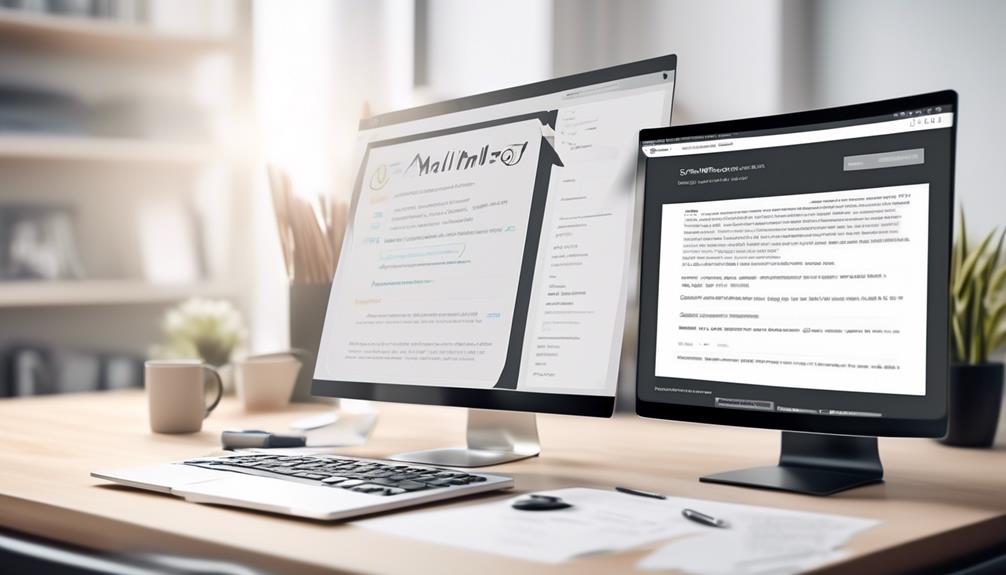When a clock strikes midnight, it signals the end of one day and the start of another; similarly, deadlines in academia mark the culmination of one phase of learning and the transition to the next.
We've all been in that situation where unexpected circumstances arise, making it challenging to meet a deadline. As students striving for academic excellence, navigating the delicate balance between responsibilities can be daunting. However, there are ways to handle such situations gracefully and professionally.
Let's explore the art of crafting an email to request an extension on an assignment, a skill that can save the day when time seems to slip through our fingers.
Key Takeaways
- Timely communication is crucial for clarifying and respecting deadlines.
- Craft a professional subject line to grab attention and convey urgency.
- Express commitment to deadlines and assure the quality of the submission.
- Articulate valid reasons for the extension and propose a reasonable new deadline.
Importance of Timely Communication
Timely communication is crucial for ensuring clarity, efficiency, and trust in professional interactions.
When we need more time to complete an assignment, asking for an extension is a common situation where the importance of timely communication becomes evident. It's essential to ask a professor for an extension on an assignment promptly and professionally.
Making sure to clearly explain the reasons why more time is needed demonstrates respect for deadlines and commitment to producing quality work.
Sending an email to your professor requesting an extension on an assignment allows for a documented record of the communication and ensures that all parties are aware of the situation.
By communicating proactively and effectively, we can build trust and credibility in our professional relationships, avoid misunderstandings, and uphold a reputation of reliability and responsibility.
Emphasizing the importance of timely communication in such scenarios fosters a positive and productive work environment where collaboration and teamwork thrive.
Crafting a Professional Subject Line

In our interactions with professors, especially when requesting an extension on an assignment, the subject line of our email plays a crucial role in setting the tone for effective communication and garnering attention.
- Crafting a professional subject line is essential:
- Use clear and concise language to convey the purpose of the email.
- Include keywords like 'Extension Request' or 'Deadline Extension' to signal the urgency of the message.
- Personalize the subject line by including your name and the assignment title if possible.
Crafting a professional subject line is the first step in initiating a conversation with your professor about the need for an extension on an assignment. By choosing the right words and being respectful of their time, you can increase the chances of a positive response to your request.
Expressing Commitment to Deadlines
To ensure our academic responsibilities are met effectively, it's imperative that we communicate our dedication to meeting deadlines promptly and professionally. When we ask our professor for an extension, it's crucial to express our commitment to delivering quality work on time. By acknowledging the importance of deadlines, we show respect for the academic process and our peers.
When requesting extra time to work on an assignment, it's essential to convey our intention to complete the task diligently and responsibly. We can assure our professor that the extension will be utilized effectively to enhance the quality of our submission. By stating our willingness to meet the revised deadline and by offering to provide progress updates if possible, we demonstrate our proactive approach to managing our time effectively.
Therefore, when expressing the need for an extension, let's emphasize our dedication to delivering the assignment on time and professionally. Please let me know if an extension is possible.
Articulating Reason for Extension

Acknowledging the importance of meeting deadlines promptly and professionally, it's now essential to clearly state the reason for needing an extension in a concise and polite manner. When articulating the reason for an extension in an email to your professor, consider the following:
- Juggling Multiple Obligations:
- Balancing various courses with conflicting deadlines.
- Prioritizing assignments based on complexity and due dates.
- Ensuring quality work by allocating sufficient time to each task.
- Serious Illness or Family Emergency:
- Dealing with unexpected health issues or family emergencies.
- Supporting a loved one through a challenging time.
- Requesting understanding and flexibility during difficult circumstances.
- Real Reason for Extension:
- Honesty and transparency in explaining the situation.
- Providing any necessary documentation or evidence to support your request.
- Expressing genuine gratitude for the professor's consideration and assistance.
When communicating the need for an extension, being honest, respectful, and appreciative can help convey your situation effectively and increase the likelihood of a positive outcome.
Proposing a New Deadline
When proposing a new deadline for an assignment extension, we must consider the feasibility and reasonableness of the timeframe provided. It's crucial to choose a deadline that allows enough time to complete the task effectively while also respecting the original due date. Here is a helpful table to guide you in proposing a new deadline:
| Deadline Options | Rationale |
|---|---|
| Three days later | Provides a reasonable timeframe for completion |
| Same as the original | Adheres to the initial timeline while offering a buffer |
| One week extension | Allows for additional time without significant delay |
| Two days earlier | Offers flexibility and shows proactive planning |
When crafting your email to the professor asking for an extension, proposing a new deadline that aligns with the course's late policy would allow you to increase your chances of receiving approval. Remember to present your request courteously and ensure you complete the assignment to the best of your ability within the agreed-upon timeframe.
Frequently Asked Questions
How Do You Politely Ask for an Extension?
When we need to request an extension politely, we can express our situation clearly and respectfully. It's crucial to communicate our reasons sincerely and propose a feasible timeline for the extension.
By being proactive and considerate in our request, we can show our commitment to completing the task effectively.
Maintaining a professional tone and demonstrating understanding can help us navigate such situations successfully.
How Do You Ask for an Extension on a Late Assignment?
When we need an extension on a late assignment, it's crucial to communicate with our professor promptly. Explaining the situation honestly and proposing a new deadline can show responsibility.
How Do You Write an Email Extension of Submission?
When requesting an extension via email, we aim to convey our situation clearly and respectfully to the recipient. It's crucial to strike a balance between being honest about our circumstances and showing accountability for our work.
Crafting a well-written email that outlines the reasons for needing an extension can help facilitate a positive response from the recipient. Remember, effective communication is key in situations like these.
How Do You Write a Letter Asking for an Extension?
When requesting an extension, we must clearly express our reasons and demonstrate responsibility. It's crucial to communicate effectively and respectfully to ensure understanding.
By outlining the situation and proposing a reasonable deadline extension, we can show our commitment to completing the task diligently.
Can I Use the Strategies for Crafting the Perfect Email Asking for an Extension when Writing an Email Asking for an Extension on an Assignment?
When writing an email asking for an extension on an assignment, utilizing the strategies for crafting a perfect extension request can be beneficial. Using a clear and respectful tone, providing a valid reason, and offering a proposed new deadline can help increase your chances of receiving the extension you need.
Conclusion
In conclusion, requesting an extension on an assignment is crucial in ensuring quality work. By clearly communicating our need for more time, we show dedication to producing our best work.
Remember, a well-crafted email can make all the difference in receiving a positive response. So, don't hesitate to reach out and ask for an extension when needed – it's better to ask for more time than to rush through and submit subpar work.









